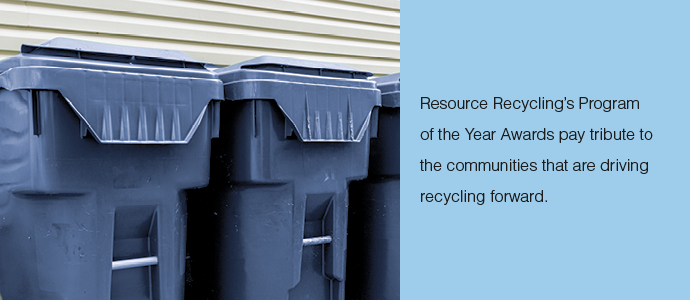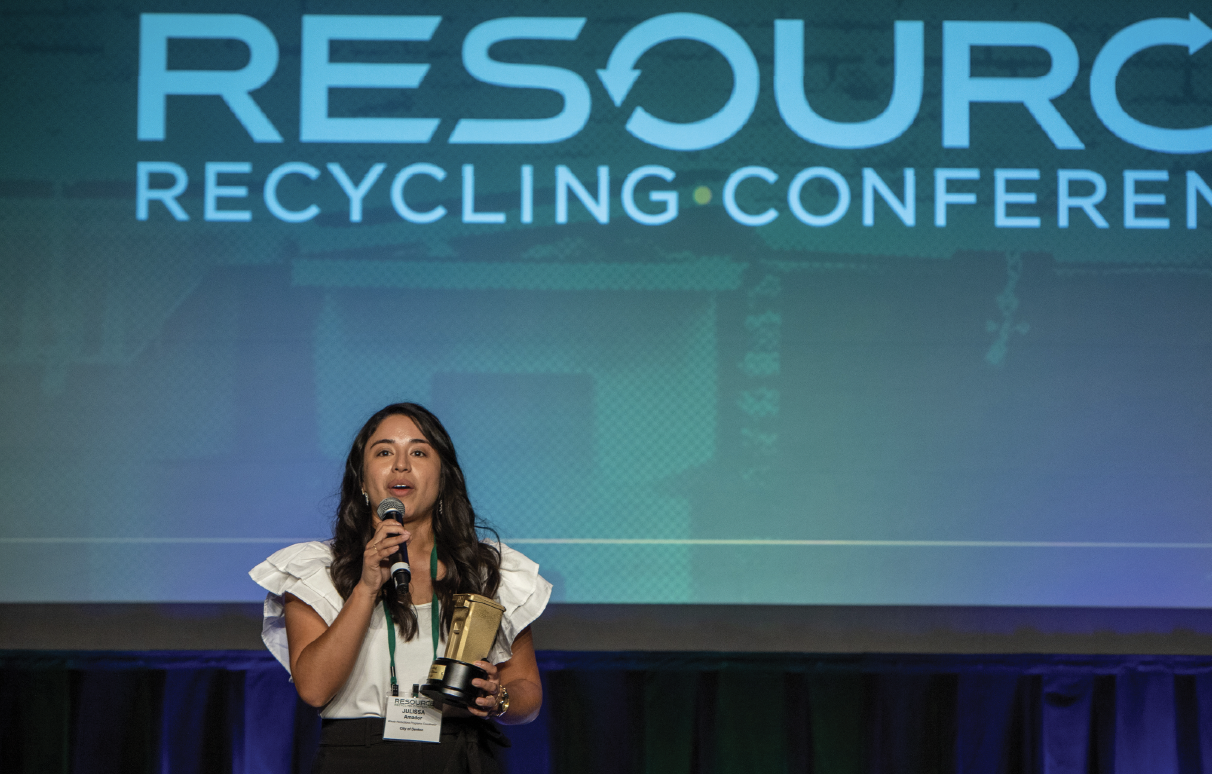
This article appeared in the September 2023 issue of Resource Recycling. Subscribe today for access to all print content.
In order to highlight trailblazers and out-of-the-box thinkers in the recycling sector, Resource Recycling each year names two municipalities as winners of its Program of the Year Awards. This year’s winners, Denton, Texas and Sarasota County, Fla., earned the honor by pushing progress in data collection, resident outreach and more.
The 2023 Program of the Year Awards initiative culminated with a winners announcement webinar on Aug. 2. The annual awards are granted by Resource Recycling to communities in two size categories: 150,000 residents or more, and fewer than 150,000 residents.
Finalists this year in the large community category were Denver, Phoenix, and Sarasota County, Fla. Small community finalists were Denton, Texas; East Lansing, Mich.; and Queen Creek, Ariz.
Representatives from the winning cities received an all-expense-paid trip to the Resource Recycling Conference in August in Orlando. The 2023 Program of the Year Awards were sponsored by Re-TRAC, which provides material management data services to clients throughout the U.S. and Canada.
The Denton, Texas program serves 37,000 households and has a 21% diversion rate. In partnership with MRF partner Pratt Recycling, Denton recently ran a multi-family pilot program that significantly reduced contamination. It also offers an evolving cart-tagging program and extensive education campaigns.
Sarasota County, Fla. serves 136,000 households and boasts a 47% recycling rate. Its MRF partner is Single Stream Recyclers, which is owned by Balcones Resources. In 2019, the county switched to cart-based recycling and amped up its data collection and marketing efforts.
Data-driven recycling
The program in Denton, a city of 148,000 people in the Dallas area, collects about 11,500 tons of recyclables every year.
It focuses on data-centric pilots to reach residents and reduce contamination, Julissa Amador, waste reductions program coordinator for Denton, said during the winners webinar.
One such pilot was launched to dig into recycling contamination hot spots in the commercial field. The city put locking bars and chute lids on highly contaminated multi-family bins. The lids have slots that make it so users have to purposely place recycling in the bin, stopping illegal dumping or mistakes.
Prior to implementing the special lids, the contamination rate on the route was 64%. Afterward, it fell to 39%. As a result of this finding, officials in Denton decided to put locking lids on bins at all commercial properties.
“That was something we were able to take and then move forward with for all of our commercial properties,” Amador said.
The city also piloted an on-the-street cart-tagging program that decreased contamination by 8% in 2021, and as a result hired a full-time cart auditor. The three-tag system lets residents know whether they’re doing well, their waste has “a little” contamination or it exceeds 15% contamination.
So far this year, more than 1,700 homes in Denton have been audited and 540 have been tagged.
The auditor also helps craft targeted social media posts and mailers based on what contamination trends they see in specific neighborhoods. Over 15,695 targeted mailers have been sent to Denton residents since October 2022, along with 70,000 citywide mailers. Bagged recyclables and film are two focuses for education.
The city also used a billboard, over-the-street banners, and ads on streaming services and at local movie theaters. A movie theater ad targeting plastic bags played for a month and made 59,888 impressions. The billboard was up for three months and received 1.4 million estimated impressions.
“That was really fun,” Amador said. “It was a great way to reach people that don’t typically follow our social media.”
MRF tours for residents and students also help spread the word about recycling in Denton, along with tabling at events, homeowner association meetings and bill stuffers. Over 400 residents and students have attended tours since August 2022, and the city hosted 67 events at various locations, with over 4,000 residents attending since October 2022.
For example, contamination from the Denton Independent School District reached 90% in 2021, but with the outreach, tours and a recycling computer game, the school district is no longer on the city’s frequent offender list.
Amador said MRF tours are a great contamination reduction tool, because they show residents “there are real people at the MRF” that are put in danger when batteries, diapers or other items end up in the bin.
Making recycling fun
Sarasota County collected 767,853 tons of recyclables in 2020, with a 26% contamination rate. It’s been running fun and engaging campaigns to increase its recycling rate, and a 2022 study conducted by Sarasota County and The Recycling Partnership found that the recycling participation rate in the sample area was 94%.
The county’s overall capture rate is 62%, well above the national average of 55%.
Oland Stokes, waste services manager for Sarasota County, said during the winners webinar that the county started mandatory recycling following a 1991 voter referendum. Today, it uses creative messaging campaigns to keep those programs growing.
The messaging campaigns aim to strike a balance between providing basic information about how to recycle and engaging information on why it’s important. Using school lessons, multimedia campaigns, direct conversations with community members and partnerships with community organizations to reach new audiences, the county is looking to increase participation.

Julissa Amador of the city of Denton Texas accepts her city’s award at the 2023 Resource Recycling Conference.
One campaign is “think before you throw, no matter where you go,” which encourages recycling outside of the home.
“We want people to see themselves in these pictures and the scenes we’ve created,” Stokes said of the graphic side of the campaign, adding that they “begin with the end in mind” when creating the messaging.
“We try to put a positive spin on it,” Stokes added. “We are all creatures of habit and when you interrupt their routine they can get upset, so we try to keep it lighthearted.”
For example, when the new recycling carts were rolled out in 2019, staff created a commercial spoofing an infomercial on how to use them, overemphasizing how difficult it can be to bring two bins to the curb by tripping in the driveway while a narrator asks, “Are you worn out from dragging two pesky recycle bins to the curb?”
The narrator then introduces a recycling cart as the solution, sharing instructions on how to roll it to the curb and where to find more information in a lighthearted way, including, “Your brand-new cart will be delivered right to your door for zero easy payments of nothing!”
Stokes said he saw a big indicator of the program’s success and community support during Hurricane Ian in 2022. The county had to suspend recycling pickup to deal with debris, and “people threw a fit,” he said. But then, they organized themselves to collect and deliver recyclables to the facility on their own, to make sure nothing ended up in the landfill when it shouldn’t have.
“To see people come together like that, it blows my mind,” he said.
This is the third year of Resource Recycling’s Program of the Year Awards. In 2021, the winners were Grand Rapids, Mich. and Olympia, Wash. The 2022 winners were Washington, D.C. and Fayetteville, Ark.
Marissa Heffernan is a staff reporter for Resource Recycling. She can be reached at [email protected].
This article appeared in the September 2023 issue of Resource Recycling. Subscribe today for access to all print content.

